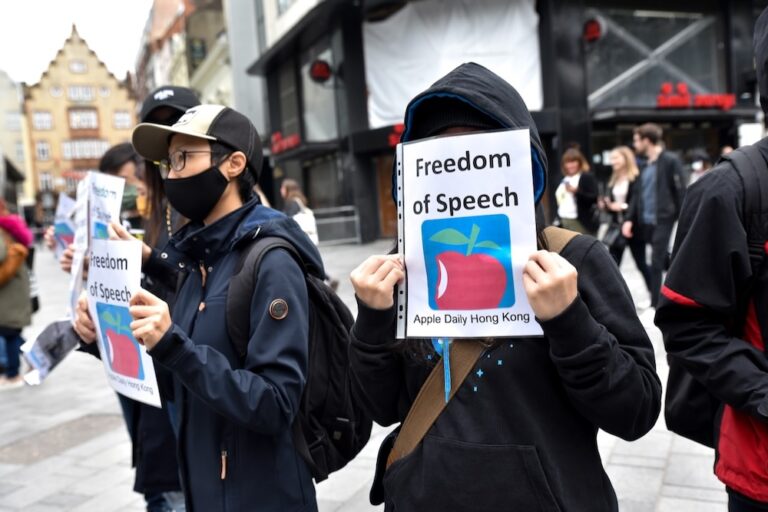A total of 119 journalists have been killed so far this year as a consequence of their work, according to the International Press Institute (IPI)'s Death Watch; IPI points to impunity as a core problem that must be addressed to end attacks against journalists.
(IPI/IFEX) – VIENNA, Nov 21, 2012 – A total of 119 journalists have been killed so far this year as a consequence of their work, according to the International Press Institute (IPI)’s Death Watch. This is the highest figure since IPI started systematically keeping track of journalists’ killings around the world in 1997.
The IPI Death Watch includes journalists who died either because of their work or while on assignment, and is therefore meant to reflect the broader hazards of the profession. However, the vast majority of journalists included on this list lost their lives in targeted killings.
The deadliest country this year was Syria, where 36 journalists and dozens more media activists have been killed, confirming the alarming trend, which IPI has witnessed in most conflicts of the past 15 years, in which journalists are targeted to prevent distribution of information that may compromise the propaganda efforts of the parties in conflict.
A total of 16 journalists have been killed this year in Somalia in targeted attacks. None of the perpetrators has been brought to justice, perpetuating a culture of impunity that encourages new attacks.
Mexico, Pakistan and the Philippines also remained dangerous places for journalists to work this year. Seven journalists were killed so far this year in Mexico, five of them in the state of Veracruz, which has been the deadliest region in Mexico for the media since 2006. Five journalists were killed in Pakistan and the Philippines, respectively, in connection with their work. In the Philippines, where the culture of impunity has been a major problem for journalists, who otherwise enjoy a good degree of freedom, the perpetrators of the murder of 32 journalists during the Nov. 23, 2009 Ampatuan Massacre have yet to be convicted.
The Middle East is the world’s deadliest region for journalists so far this year, with 36 journalist deaths in Syria, three in Iraq, three in the Palestinian Territories and one in Bahrain. Africa comes second, with a total of 27 journalists losing their lives, including 16 in Somalia, five in Nigeria, four in Eritrea and one each in Tanzania and Angola. A total of 26 journalists have been killed in Asia, including seven in Indonesia, five of whom perished in a plane crash while on assignment. In addition to the previously-mentioned deaths in Pakistan and the Philippines, three journalists were killed this year in Bangladesh and two in India.
A total of 22 journalists have been killed so far this year in Latin America, where Mexico, Brazil, Honduras and Colombia – with seven, four, three and two journalists killed, respectively – have seen the continuation of a trend of violent attacks against journalists in that region. Four journalists were killed in Peru in a car accident while on assignment, and one in Ecuador, shot by two men on a motorcycle.
“It is deeply disturbing that in spite of a clear increase in international efforts to stop attacks against journalists, this year’s death toll is the highest on IPI record,” said IPI Deputy Director Anthony Mills. “The killing of a journalist is the ultimate, most callous, chilling form of censorship. Unless we are able to roll back the cynical tide of impunity, these killings will continue.”
On Nov. 23, IPI will join journalists and civil society groups from around the world in commemorating the International Day to End Impunity (IDEI). The day marks the anniversary of the Ampatuan Massacre in the Philippines and aims to highlight the fact that impunity remains one of the core problems in efforts to end attacks against journalists.
**PLEASE NOTE: On Nov. 22 at 10 am CET, IPI held a livestream panel on the safety of journalists. The panel included: Frank La Rue, United Nations Special Rapporteur on the promotion and protection of the right to freedom of opinion and expression; Christof Heyns, United Nations Special Rapporteur on extrajudicial, summary or arbitrary executions; Roland Bless, Principal Adviser, Office of the Representative on Freedom of the Media, Organization for Security and Cooperation in Europe (OSCE); Guy Berger, Director, Division of Freedom of Expression and Media Development, UNESCO; Anita Zielina, Deputy Editor-in-Chief, DER STANDARD & derStandard.at, Austria; Karl Bostic, former Chief, NBC News, Baghdad Office. The panel was moderated by IPI Deputy Director and former CNN correspondent Anthony Mills. Click here for more information.


